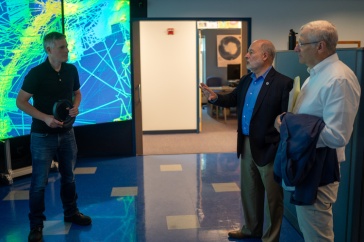
On the 30th anniversary of the Exxon Valdez oil spill, researchers at UNH dedicated a unique oil flume?made possible through a generous gift by Neil and Ora MacFarlane. For Melissa “Missy” Gloekler ’16, who is currently pursuing her doctorate in civil and environmental engineering at UNH, the dedication was not an ending but a milestone in her ongoing work.
Taking some time to chat at the Coastal Response Research Center (CRRC) where the flume is housed, Gloekler talks about the flume’s creation and how this project changed the course of her graduate study here at UNH. Working with renowned researcher and professor Nancy Kinner has been an experience Gloekler says she would not trade. She is right where she wants to be — but it wasn’t where she envisioned herself when she started at UNH in 2012.
The Bow, New Hampshire, resident came to UNH to play soccer, but a career-ending concussion meant a change of plans. She had also planned to major in biomedical science. “I thought that was what I wanted to do, and then I took an environmental science course,” she says, smiling.
That course was the first step in a path that would take her to Uganda to work with Engineers without Borders as an undergraduate. There, she met Kathy Mandsager, who works closely with Kinner as the administrative manager at the CRRC. Gloekler at once felt a connection with the CRRC that only grew when she returned to campus to find she’d be working closely with Kinner herself on her senior project.

Gloekler wasn’t planning on grad school at the time, but a conversation with Kinner changed that: “She asked, ‘Do you want to be my graduate student next year?’ You don’t say no to the chance to go to grad school with Dr. Kinner. It’s one of those opportunities you don’t pass up.”
And it was right in line with that advice she received early on in her UNH career, when her older siblings, both UNH grads, told her not to leave without a technical degree. “It was going to be a master’s degree,” Gloekler says with a smile, “and then, enter the flume.”
Through the generosity of the MacFarlane family, the CRRC had the opportunity to create a new flume that would empower UNH students and scientists to better research oil spill mitigation. Part of Gloekler’s work would be to help design and build it.
“I had no idea what I was saying yes to. There was a huge learning curve, and this was truly a team effort. I got a lot of help from undergraduates working in Dr. Kinner’s lab, and John Ahern, UNH facilities and my fiancé Matt McGinnis, who studied structural engineering here at UNH. It wouldn’t have been possible without them,” she explains. “In June of 2017, I realized I would not be able to finish the flume project and my research in the span of a master’s degree program alone and decided to pursue my Ph.D.”

With the flume now completed, Gloekler is able to research submerged and sunken oil to better respond to and mitigate oil spills by simulating real-world conditions.
“I didn’t know I would love working hands-on like this until I did it,” Gloekler says. “I want to thank the MacFarlanes for giving me this wonderful opportunity."
The dedication date of March 24 was also important in honoring the memory of one of the project's benefactors, Neil MacFarlane, who had worked on the Exxon spill as an environmental engineer.
"I got into environmental engineering to help people, perhaps through emergency response working with NOAA or the Coast Guard," Gloekler says. "The flume is helping me prepare to do just that.”
Interested in opportunities like this? See what UNH's College of Engineering and Physical Sciences has to offer.
-
Written By:
Jennifer Saunders | Communications and Public Affairs | jennifer.saunders@unh.edu | 603-862-3585



















































